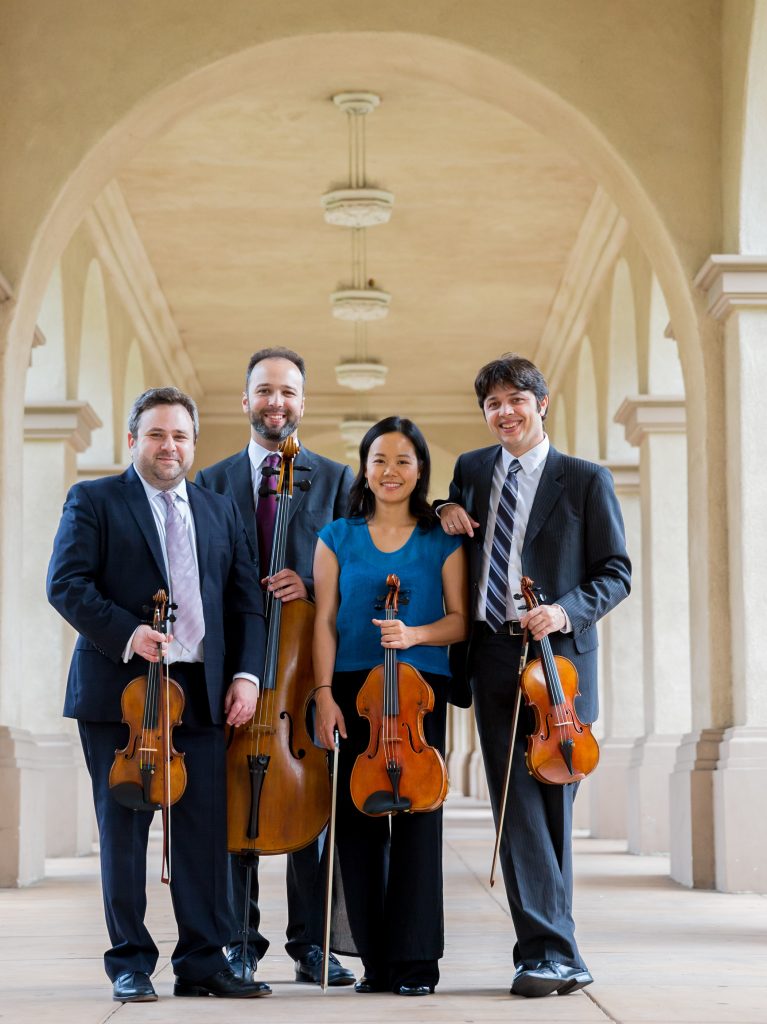Hausmann Quartet Brings Haydn’s ‘Seven Last Words’ to an East Village Loft
In addition to the Hausmann Quartet’s multi-year traversal of all the Joseph Haydn string quartets, the intrepid San Diego ensemble has annually presented during the season prior to Easter the composer’s string quartet version of his profound orchestral work The Seven Last Words of Christ. This year, Hausmann gave their concert Sunday (April 14) in the Luce Loft down in San Diego’s East Village, expanding their format by adding short contemporary readings to precede each of the movements of Haydn’s work.

Hausmann Quartet: Bram Goldstein, Alex Goldbaum, Angela Choong & Isaac Allen [photo courtesy of Hausmann Quartet]
The Hausmann Quartet’s secular performance setting, a spare, unadorned concrete loft with audience members seated on folding chairs, provided the appropriate circumstances for secular readings about contemporary experiences that related to the musical subject of each of the seven “last words.” For example, Jennifer Stiff gave the piognant reading “Please Stop Being Gay,” a young school child’s attempt to absorb the reactions of parents and teachers to the revelation of movie star Rock Hudson’s death from AIDS, before Haydn’s first word sonata “Father forgive them, for they know not what they do.” Before the sonata based on Jesus’ words “Mother, behold thy son,” David Latham read “Last Call,” a stirring account of an adult son’s desperate last minute efforts to find a priest to give his dying father last rites.
Historians tell us that Haydn was both a pious believer as well as a child of the Enlightenment, so it is not surprising that his instrumental meditations on the seven last words are serious but not doleful. Hausmann delivered the profound emotional subtext of these glowing movements, sculpting Haydn’s profuse melodic inventory with ardent rigor. Because Haydn assigned most of the melodic exposition to the first violin and cello, Hausmann altered their usual arrangement of seating the first and second violinist together and instead placed cellist Alex Greenbaum next to first violinist Isaac Allen.
I regularly cover Hausmann, and I felt that Allen offered some of his finest performances Sunday, whether interpreting serene phrases of sublime consolation in the first two sonatas or bereft anguish in his commanding, extended solo in the fourth sonata “My God, My God, why have you forsaken me?” Greenbaum’s generously scaled, captivating solos in the third and seventh sonatas proved equally impressive, and when Haydn vigorously intertwined these two voices in the fifth and sixth sonatas, they soared eloquently. Second violin Bram Goldstein and violist Angela Choong strengthened the ensemble at every turn with rich sonorities and ensemble precision.
Haydn ends his seven meditations with a short but tumultuous musical representation of the earthquake mentioned in Luke’s Gospel. Hausmann handily conveyed its surprise and terror.
This concert was presented by the Hausmann Quartet and the So Say We All organization on Sunday, April 14, 2019, at the Luce Loft, 1037 J Street, San Diego.

Ken Herman, a classically trained pianist and organist, has covered music for the San Diego Union, the Los Angeles Times’ San Diego Edition, and for sandiego.com. He has won numerous awards, including first place for Live Performance and Opera Reviews in the 2017, the 2018, and the 2019 Excellence in Journalism Awards competition held by the San Diego Press Club. A Chicago native, he came to San Diego to pursue a graduate degree and stayed.Read more…
